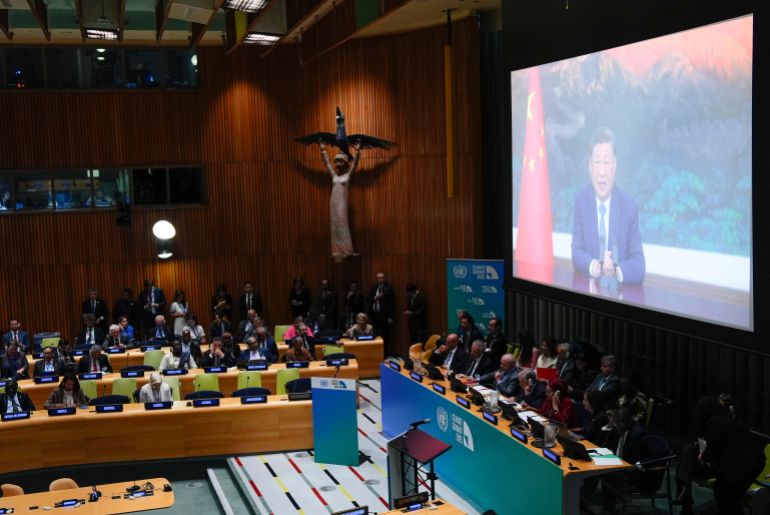China’s new target for cutting greenhouse-gas emissions has been branded “disappointing” and “underwhelming” by climate experts, who warn the pledge falls far short of the action needed to avert climate catastrophe.
But the goal also raised hopes that China, which until now has only promised to stop emissions from rising, may be underpromising the level of cuts it can deliver amid a massive expansion in the country’s renewable energy capacity.
Recommended Stories
list of 4 itemsend of list
In a video address to the United Nations on Wednesday, Chinese President Xi Jinping said China would lower its emissions by 7-10 percent from their peak by 2035.
It was the first time that China, the world’s biggest polluter, outlined a goal for cutting emissions outright.
Xi, who called the shift away from carbon “the trend of our time”, also pledged to raise the share of non-fossil fuel sources in energy consumption to more than 30 percent, and increase wind and solar capacity sixfold compared with 2020.
While a significant moment in the global fight against climate change at a time when the United States is abandoning efforts to cut emissions, China’s target fails by some distance to align with the goals of the Paris Agreement, said some analysts.
“It’s unfortunately very disappointing: This target will not drive down emissions – it is below what China is likely to achieve already under its current climate policies,” Bill Hare, CEO of Berlin-based policy institute Climate Analytics, told Al Jazeera.
“China can do a lot better than this, and it hardly reflects its highest possible ambition.”
The Centre for Research on Energy and Clean Air (CREA) has estimated that China would need to cut emissions by about 30 percent to be consistent with the Paris accord.
The agreement, adopted by 195 countries in 2015, calls for the rise in the average global temperature to be limited to 1.5 degrees Celsius (2.7 degrees Fahrenheit) above pre-industrial levels.
China’s actions on climate are viewed as especially critical following the US’s exit from the Paris accord under President Donald Trump, who used his UN speech this week to call the scientific consensus on climate change the “greatest con job ever perpetrated on the world”.
“China’s underwhelming headline target misses a chance to deliver real leadership,” Li Shuo, director of China Climate Hub at the Asia Society Policy Institute, told Al Jazeera.
“Beijing is choosing to tiptoe forward when science calls for a full sprint. The pledge would, unfortunately, still put the world on a pathway to catastrophic climate impacts.”
Xi’s announcement left key questions about the emissions target unanswered, including how Beijing would define peak emissions.
Many climate experts believe that China’s emissions have already peaked or will do so this year, though some observers caution that the trend has been driven as much by the decline in business activity during the COVID-19 pandemic as the rollout of renewable energy.
China has had a paradoxical influence on global efforts to address climate change.
While responsible for roughly one-third of global emissions, the country is also a leader in green energy.
China produces about 80 percent of the world’s solar panels and 70 percent of its electric cars, according to the International Energy Agency.
The country also manufactures about 60 percent of wind turbines worldwide, according to London-based energy think tank Ember.
At the same time, China has continued to invest heavily in coal.
Last year, construction began on nearly 100 gigawatts (GW) of new or suspended coal power projects, the most in a decade, according to the CREA.
“China’s new pledge clearly falls short of expectations. Despite President Xi’s earlier promise to strictly control new coal power, the country has just approved more projects than at any point in nearly a decade,” Andreas Sieber, the associate director of policy and campaigns at 350.org, told Al Jazeera.
“The targets announced today, which are vague on the base year and conservative on renewables, leave ample room for continued emissions growth from coal-heavy sectors.”
Still, climate experts expressed hope that China’s target could be a signal of more transformative change to come.
While China’s announcement fell short of expectations, Beijing has a tendency to set targets that it can “confidently deliver”, said Yao Zhe, a Beijing-based policy adviser to Greenpeace East Asia.
“What’s hopeful is that the actual decarbonisation of China’s economy is likely to exceed its target on paper,” Yao said in a statement responding to the target, adding that her organisation’s latest analysis showed that emissions from China’s power sector could peak this year.
In a world “increasingly driven by self-interest”, China is in a stronger position than most to spur climate action, the Asia Society’s Li said.
“The country has emerged as a global clean tech superpower, and its dominant role in this sector could enable it to surpass current targets,” he said.
“Over time, this could push China toward a more proactive role on the international stage.”
